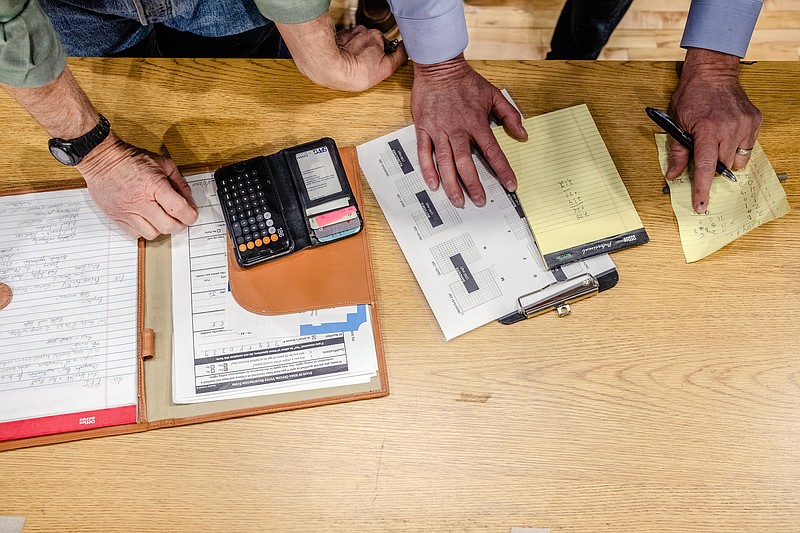Democracy is messy. But it doesn't have to be as messy as the Iowa Caucus made it Monday night when a software flaw caused a lot of stomach churning at a time when discussion of foreign interference in our elections is an everyday conversation.
It turns out - if the feet on the ground in Iowa are to be believed - that it was a flawed app put together in the last two months for the Iowa and Nevada Democratic parties. And plain old bad planning.
For starters, the app technology company's name should have seemed an omen: Shadow Inc.
Secondly, the app was not properly tested at a statewide scale, people who were briefed on the app by the state party told The New York Times on Tuesday.
(MORE: Tech problem with mobile app causes Iowa caucus chaos)
"We found inconsistencies in the reporting of three sets of results," said Mandy McClure, spokeswoman for the Iowa Democratic Party. But she said it was "simply a reporting issue, the app did not go down and this is not a hack or an intrusion."
So it was back to the drawing board - or more specifically counting votes handwritten on paper. In the meantime, no fewer than five Democratic candidates (and Republican President Donald Trump) delivered something akin to victory speeches.
The bigger fail, however, is the Iowa Caucus itself. It's meaningless. It's a waste of time and money. It's an anachronism that needs to go away.
Has anyone who's ever won the Iowa Caucus ever actually become president? Answer: only three times (outside of incumbents seeking a second term). And all three - Jimmy Carter, George W. Bush and Barack Obama - ran in the age of big TV, making it easier for them to cash in on donations to maintain momentum.
What's more, being an Iowa Caucus winner historically has only given candidates a little better than a 50-50 shot at becoming their party's nominee - including incumbent presidents with significant primary challengers, according to a tally by The Des Moines Register.
But the larger truth is starker. Turnout was said to be mediocre - not the flush that Democrats have said they must have to defeat Trump in November. It would seem that Iowans, like many of us, are disgusted with all politicians. Of all stripes. And as the app fail became apparent and Democratic Party caucus officials in blue shirts emblazoned with "Democrats have 20/20 vision" huddled over notebooks, the picture wasn't pretty.
Politico wrote: "Democrats were counting on Barack Obama-levels of enthusiasm. They got Hillary Clinton numbers, instead."
Let's hope it's just too early for real go-the-polls-and-beat-Trump excitement. The Washington Post's columnist Karen Tumulty wrote of her past week's on-location Iowa coverage: "The voters I talked to seemed confused and anxious in the final hours before the caucuses, more torn than usual over which candidate to pick in a field that still numbers nearly a dozen. All but absent were the public displays of commitment to one candidate or another - the yard signs that typically dot suburban lawns and plaster the sides of barns in the countryside."
But again, what's to be expected? Iowa is a very rural, very white state with a population of 3.1 million - less than half the population of Tennessee. Its largest city, Des Moines, has just over 217,000 residents.
Why not make the first political flash out the gate a first early primary (with real one-to-one votes, not the process of elimination series of tallies Iowa makes until one candidate gets at least 15% of the vote).
That first primary - call it Super Monday - could combine Iowa, Nevada, New Hampshire and South Carolina. The voters would be a more diverse slice of the country and would represent the East, the West, the South and the Midwest.
(MORE: Buttigieg slightly leading Sanders in partial Iowa caucus results)
Sure, there would be some grousing from Iowa, as the Caucus is no-doubt a tourism moneymaker for the land of corn and pigs. (According to the Iowa Area Development Group, the state produces 1/14th of the nation's food supply and is the largest producer of corn, soybeans, pork and eggs in the United States - and second in red meat production).
But frankly, the Iowa Caucus is pretty useless for the rest of the country.
Its primary (no pun intended) purpose is to give the media something to focus on for political diehards in years without impeachment and the jaw-dropping hourly embarrassments of Trump. Caucuses are different from primaries because they require that voters go to a meeting to participate in the nominating process. And this means caucuses can get pretty lively at local precincts where voters literally try to persuade each other in small groups. It makes great video to sit behind the talking heads of TV.
But come on. Just attend Congress town hall meetings instead. The stages set with only cardboard cutouts of our absent politicians could make great video, too. Then Iowa could stop twisting our election process by awarding delegates in a state whose population is more than 90% white.
People who support the Iowa caucuses argue, on the other hand, that their caucus system serves the important function of giving candidates the incentive to come to and support causes important to a relatively small and rural state. That, frankly, has some validity, but the disadvantages Iowa puts on the rest of our political process is an unfair trade-off.
It's time for the Iowa Caucus to go bye bye.
